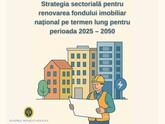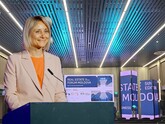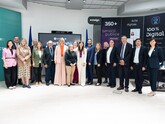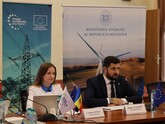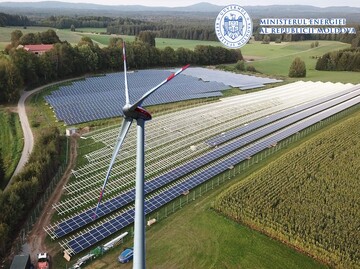
Moldova will continue to attract investments in renewable energy sources and energy storage solutions, implement projects to strengthen energy independence and integration into the EU energy market
The Ministry of Energy announced this, noting that the Ministry's current priorities and the progress achieved in the sector were discussed at a meeting of the Sectoral Council on External Assistance in the Energy Sector. The agenda included both a presentation of the achievements of recent months and the urgent needs of the Ministry in the context of transforming the national energy system into a safe, sustainable, and European one. The event was attended by representatives of development partners, energy sector institutions, the Energy Community Secretariat, the United Nations Economic Commission for Europe (UNECE), UNDP, the World Bank, as well as international cooperation agencies, supporters of energy reform in Moldova, and industry enterprises. At the opening of the event, Energy Minister Dorin Junghietu emphasized Moldova's ambitious commitments in the process of European integration and the authorities' determination to move quickly in implementing reforms, and thanked external partners for all the support provided in the process of harmonization with the EU energy market. Dorin Junghietu said that today Moldova's energy sector is closer than ever to Europe. "Within Cluster IV – Green Agenda and Sustainable Interconnectivity – we have committed to fully comply with EU energy legislation before joining the EU. Under Chapter 15, “Energy,” we have to transpose 59 European legislative acts, backed up by 79 national regulations. In one year, the ministry responsible for 62 measures has managed to complete more than half of them," said the Minister of Energy. According to him, in parallel with the process of transposing European legislation, the Ministry of Energy continues to make progress in implementing strategic projects that increase the country's sustainability and energy independence. Projects such as the completion of the Vulcanesti-Chisinau high-voltage line and the construction of the Balti-Suceava and Straseni-Gutinas power lines with the support of Romania and the United States are key priorities that will contribute to Moldova's integration into the European energy market. The latest legislative reforms necessary for market development, carried out with the support of external partners, were also presented: for example, the new version of the Electricity Law, which transposes the EU's 4th Energy Package, will contribute to market liberalization, stimulate competition, and electrify the economy. At the same time, amendments to the Natural Gas Law provide for the introduction of uniform distribution tariffs, which contributes to the opening of the market and an increase in the share of the free market, including in the Transnistrian region. State Secretary of the Ministry of Energy and Chair of the Working Group on Section 15 “Energy” Cristina Pereteatcu noted the progress made in the field of digitalization and innovation, despite the difficult regional situation and the large-scale energy crisis. "We have good reason to be proud. Even during the crisis, we managed to launch transformative projects, one of which is the Energy Sandbox, the first project of its kind for Moldova. Without the support of UNDP in Moldova and Denmark, this project would not have been possible. By launching the Energy Sandbox, we are taking a decisive step towards the transition to green energy. We have created a platform where innovative ideas and solutions can be tested in real-world conditions, providing the government and investors with valuable data for future policies and projects that will contribute to the country's economic growth," said Cristina Pereteatcu. The meeting also discussed the technical and financial needs of the Ministry, including: feasibility studies for the Straseni–Gutinas (400 kV) and Balti-Dniester (330 kV) high-voltage lines, which are scheduled for implementation in 2027; modernization of infrastructure and improvement of network security through the purchase of equipment that complies with ENTSO-E standards; development of software tools for forecasting energy production, calculating its sufficiency, and integrating it into the European energy network. An important emphasis was placed on the need to continue investing in renewable energy sources and energy storage solutions. During the discussions, it was noted that Moldova has all the necessary conditions to strengthen its energy independence, in particular by using its own resources and increasing the share of renewable energy sources in national consumption. In this context, participants were informed that the Ministry of Energy is in the final stages of preparing the second round of tenders for the development of a project to build wind farms with a total capacity of 173 MW with modern energy storage systems, which is scheduled to be launched in the near future. The technical agenda of the meeting also included presentations by Premier Energy, which highlighted the need to develop a study on the reconfiguration of the 110 kV network in Chisinau. Representatives of the Center of Excellence in Energy and Electronics presented a proposal to establish a Training Center-Laboratory for the practical training of specialists in the field of electrical engineering. In conclusion, the National Center for Sustainable Energy and the Consolidated Unit for the Implementation and Monitoring of Energy Projects (UCIPE) presented updated information on the progress of externally funded projects. The Sector Council holds quarterly meetings to provide a framework for coordinating assistance for the development of the energy sector and dialogue with external partners in the context of continuing challenges in the energy sector, as well as to promote the process of compliance with European standards of sustainable development, security, and energy sustainability. // 17.09.2025 — InfoMarket.


